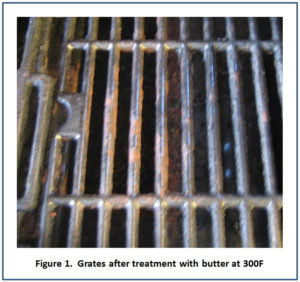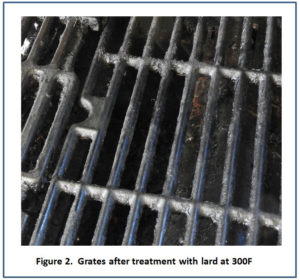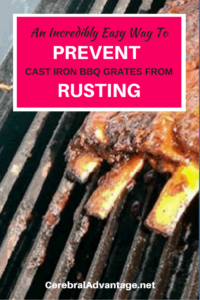An Incredibly Easy Way To Prevent Cast Iron BBQ Grates From Rusting
Here at CerebralAdvantage.net, we mostly focus on right thinking and acquiring the right mindset and mental skills to lead a highly successful life.
However, we are also on the lookout for tips and tricks for working smarter or doing things better and will report those when we find them. We consider such things as right thinking in action.
Our first tip is for around the house. For the BBQ, actually.
Many of us enjoy grilling whenever we can, cooking hot dogs, burgers, steaks, and a variety of other foods on our BBQ. A BBQ imparts a unique flavor to foods; a flavor that we all love.
I have a BBQ with cast iron grates and I have a love-hate relationship with the thing.
I love how the cast iron grates cook my food. Their high thermal mass provides uniform heating and helps get my food done just right every time. They just seem to cook food much better than stainless steel or other materials.
But I hate the cast iron grates because they rust. No matter how careful you are with them, even if they are porcelain coated, which mine are, they will eventually rust. And once they start, they can really, really rust.
And cooking food on rusty BBQ grates is not something I want to do.
So, what is the solution?
Let’s take a look at what works and what doesn’t.
Cooking Oils:
An online search revealed that a common way to season (protect) cast iron skillets so they don’t rust is to heat them with various types of cooking oils. Vegetable oil, extra virgin olive oil, and canola oil were the oils mentioned most often.
I tried these oils on my cast iron BBQ grates with the following results:
● Vegetable Oil: Ineffective in preventing rust. Also developed a bad odor over time.
● Canola Oil: Much better than vegetable oil for protecting against rust, although some rust still occurred.
● Canola Oil with Flour as a Filler: Better than canola oil alone.
● Extra Virgin Olive Oil: Less effective than canola oil.
Although some success was achieved with canola oil and canola oil plus flour, they were less than ideal rust preventives. These oils burned off easily and had to be reapplied after each use of the grill. Plus, to achieve good rust protection, multiple coatings were needed.
Overall, my results with the different oils were disappointing, so my search continued for a way to keep my grates from rusting.
Lard, the Ultimate Solution:
Lard is rendered pig fat. I saw it mentioned in a comment on the Internet as a good agent to keep food from sticking to a grill. Thus, I decided to try it to see if it could also season the grates.
Wow! What a difference!
As soon as I applied the lard, it seemed to coat any rust present. It was almost like a chemical reaction took place with the rust. And it immediately stopped any further rust from forming.
After using the grill, the grates maintained a nice black protective coating.
Initially, I applied additional lard to the grates after each use of the grill. However, once a robust protective coating has been achieved on the grates, additional lard shouldn’t be needed unless the coating is burned off or spots of rust are observed.
I’ve found that the lard coating is stable up to at least 400F. I know that a lot of people like to sear their steaks at temperatures significantly higher than this. If they find that the protective coating burns off, they will just have to apply additional lard after each use. Not really a problem, but something to look for.
I live in Florida and during the hot, humid summer months, I am finding that some small areas of rust appear on the grates if the grill is not used for several weeks. The rust is mainly isolated to the area where food was last cooked. However, a new protective layer is easily created over the rust by applying some lard to the affected areas before the next use of the grill.
As noted above, lard is also good for keeping food from sticking to the grates so I’ve now adopted the practice of applying a little lard to the grates before each use to prevent food from sticking and to provide a fresh layer of protection for the grate area in direct contact with the food.
Initially, I applied the lard using a paper towel to smear it on the grates. This is how I now apply lard to localized areas before cooking.
To apply lard to the entire grill, I now melt a small amount of lard in a paper cup in the microwave and then paint it onto the grates using a basting brush. This is much easier and faster then trying to apply the solid lard.
Lard is absolutely magical for treating cast iron grill grates and preventing them from rusting!
And lard is inexpensive, costing only about a dollar a pound.
How About Butter?
After treating my cast iron grates with lard for several months, I decided to try butter to see if it would also work to maintain my treated grates. Initial results were positive, indicating that butter may be able to maintain already treated grates. However, I was also interested to see how effective butter was in actually treating rust.
I got my chance after having a major flare-up where some grease caught fire and the protective layer was burned off a portion of the grates. It wasn’t long before lots of red rust appeared, thus providing a good test for butter.
I applied a coating of butter and heated the grill to approximately 300F and held it there for about half an hour. The results, shown in Figure 1, were very disappointing. The rust remained, virtually unaffected by the butter.

I then applied a coating of lard to the grates and again heated the grill to about 300F. The difference in results was night and day. As shown in figure 2, the red rust was completely gone, covered by a black, protective layer of carbon.

These results were very convincing. Butter is ineffective for treating rust. Lard is clearly the secret agent for treating rust and keeping your BBQ grates rust-free.
Action Plan:
Here’s your Cerebral Advantage Action Plan for keeping your cast iron BBQ grates free from rust.
Step 1: Go out and buy a pound of lard. It should cost about $1.25.
Step 2: Melt a small amount of lard in a paper cup in the microwave for about 30 seconds and apply it to the grates using a basting or small paint brush. Cover the entire grate area. When melting the lard, place a small bowl under the cup just in case the cup should give way. This shouldn’t be an issue but having a bowl under the cup will prevent a mess in the microwave should the cup collapse.
Step 3: Whenever using the BBQ grill, apply lard to the area of the grate that will be in contact with the food to prevent the food from sticking and to apply a layer of protection for the grate in direct contact with the food. This can be done by smearing solid lard on the grate with a paper towel or by applying melted lard with a brush.
Step 4: Whenever any rust is observed on the grates, scrape it off with a small block of wood or other suitable device and apply a new layer of lard to the area.
Step 5: Periodically, apply a new layer of lard to the entire grate to keep it protected.
Summing Up
I was just about ready to trash my grill and go out and buy a new stainless steel unit. But now, I will be able to get several more years of service out of my current grill.
How great is that! Definitely right thinking in action!
If you have a BBQ grill with cast iron or porcelain-coated cast iron grates, go out and get yourself some lard today and start using it. You’ll be glad you did.
Think Right. Live Well.
Last Updated: February 08, 2019

Other Articles You Might Like:
● 2 Amazing Cleaning Formulations For Removing Hard Water Stains From Tile Shower Floors






No Comments